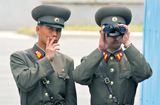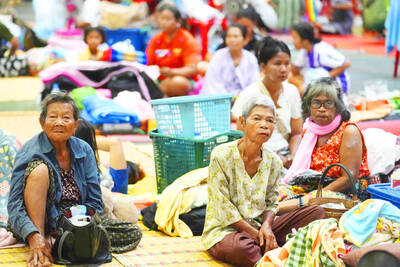Pyongyang has scrapped two of its spy agencies to beef up a third run by the Defense Ministry, a news report said yesterday, a move that analysts say will give North Korean leader Kim Jong-il’s military more power.
Kim has devoted much of his country’s scarce resources to his 1.2 million-member military — one of the world’s largest — under his songun, or “military-first” policy.
The isolated communist regime previously operated four to five major spy agencies, primarily to collect intelligence on South Korea.

PHOTO: AFP
The two countries are still technically at war since their conflict ended in 1953 with a truce, not a formal peace treaty.
The North also uses the agencies to drum up sources of income, by engaging in illicit drug trafficking, weapons trade and counterfeiting foreign currency, according to the South’s Unification Ministry.
Yonhap reported that the North dismantled two agencies run by the Workers’ Party and incorporated them into an organ run by the People’s Armed Forces — a body equal to a defense ministry.
A fourth agency was downsized, the report said, citing sources it says are privy to North Korean affairs.
South Korea’s Unification Ministry and the National Intelligence Service would not confirm the Yonhap report.
The report said the reshuffling would increase the military’s control in intelligence-gathering and reduce redundancy among the agencies.
Yang Moo-jin, a professor at the University of North Korean Studies, agreed, saying the measures appeared to be aimed at giving Kim’s military and the National Defense Commission more power, which will also strengthen his leadership.
The North’s rubber-stamp parliament reappointed Kim as the head of the commission — the top government body — in last month’s closely watched session that helped prove Kim was still in control despite his reported stroke in August.
Tensions on the Korean Peninsula have intensified since the North launched a rocket on April 5, drawing a denunciation from the UN Security Council and further sanctions.
Pyongyang claims it put a satellite into orbit, but the US and its allies say the launch was really a test of the country’s missile technology.
The North angrily vowed to restart its nuclear program in response to the UN statement.

FOREST SITE: A rescue helicopter spotted the burning fuselage of the plane in a forested area, with rescue personnel saying they saw no evidence of survivors A passenger plane carrying nearly 50 people crashed yesterday in a remote spot in Russia’s far eastern region of Amur, with no immediate signs of survivors, authorities said. The aircraft, a twin-propeller Antonov-24 operated by Angara Airlines, was headed to the town of Tynda from the city of Blagoveshchensk when it disappeared from radar at about 1pm. A rescue helicopter later spotted the burning fuselage of the plane on a forested mountain slope about 16km from Tynda. Videos published by Russian investigators showed what appeared to be columns of smoke billowing from the wreckage of the plane in a dense, forested area. Rescuers in

‘ARBITRARY’ CASE: Former DR Congo president Joseph Kabila has maintained his innocence and called the country’s courts an instrument of oppression Former Democratic Republic of the Congo (DR Congo) president Joseph Kabila went on trial in absentia on Friday on charges including treason over alleged support for Rwanda-backed militants, an AFP reporter at the court said. Kabila, who has lived outside the DR Congo for two years, stands accused at a military court of plotting to overthrow the government of Congolese President Felix Tshisekedi — a charge that could yield a death sentence. He also faces charges including homicide, torture and rape linked to the anti-government force M23, the charge sheet said. Other charges include “taking part in an insurrection movement,” “crime against the

POINTING FINGERS: The two countries have accused each other of firing first, with Bangkok accusing Phnom Penh of targeting civilian infrastructure, including a hospital Thai acting Prime Minister Phumtham Wechayachai yesterday warned that cross-border clashes with Cambodia that have uprooted more than 130,000 people “could develop into war,” as the countries traded deadly strikes for a second day. A long-running border dispute erupted into intense fighting with jets, artillery, tanks and ground troops on Thursday, and the UN Security Council was set to hold an emergency meeting on the crisis yesterday. A steady thump of artillery strikes could be heard from the Cambodian side of the border, where the province of Oddar Meanchey reported that one civilian — a 70-year-old man — had been killed and

Philippine President Ferdinand Marcos Jr is to meet US President Donald Trump this week, hoping Manila’s status as a key Asian ally would secure a more favorable trade deal before the deadline on Friday next week. Marcos would be the first Southeast Asian leader to meet Trump in his second term. Trump has already struck trade deals with two of Manila’s regional partners, Vietnam and Indonesia, driving tough bargains in trade talks even with close allies that Washington needs to keep onside in its strategic rivalry with China. “I expect our discussions to focus on security and defense, of course, but also